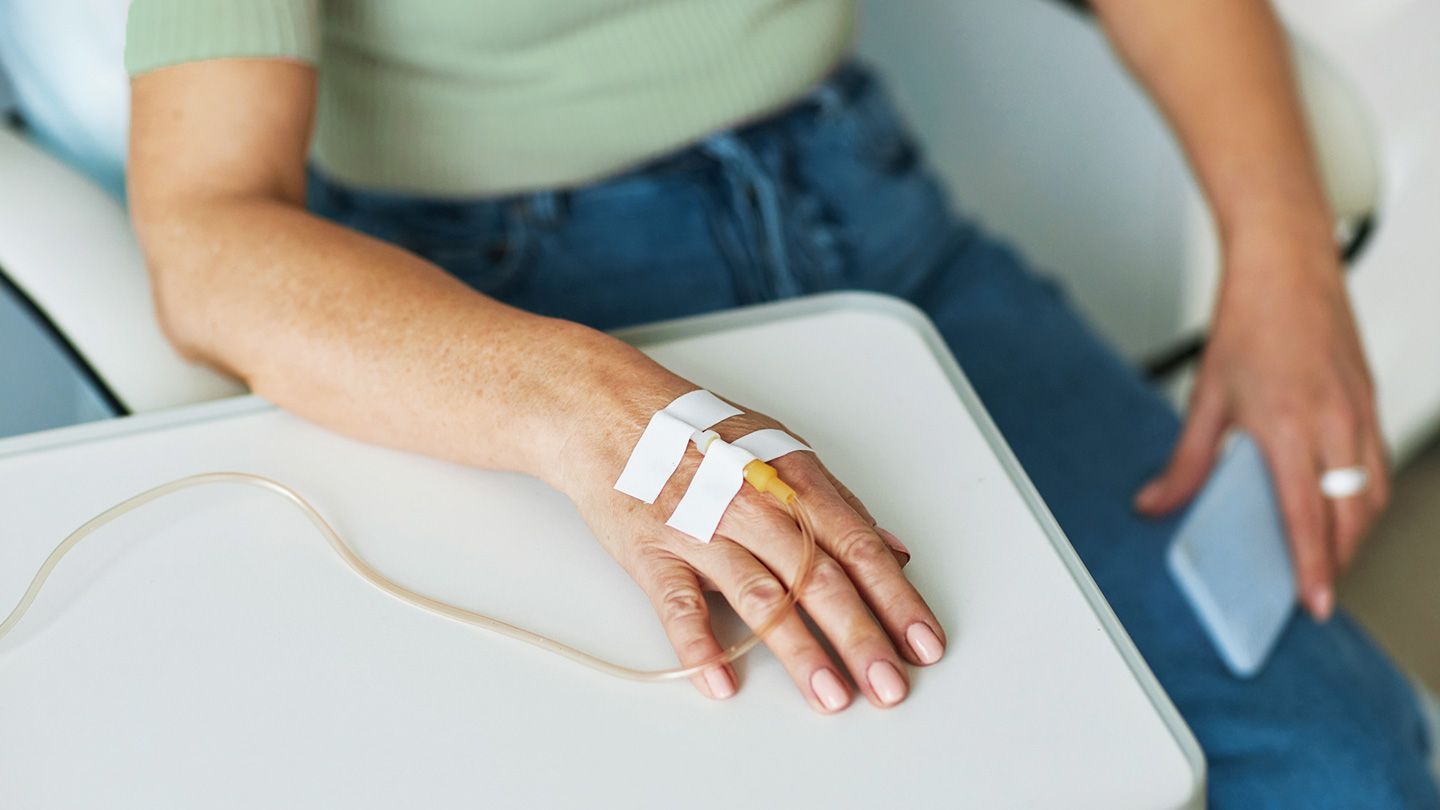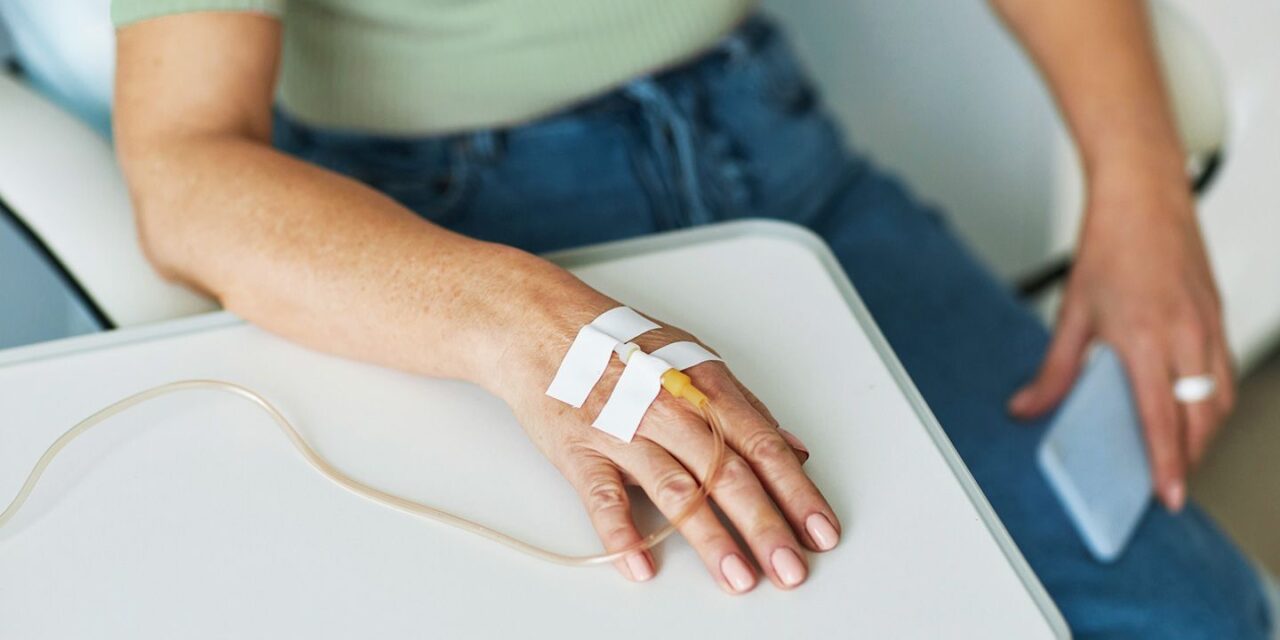
Chemotherapy can cause a slew of harsh side effects that go beyond hair loss. But some people with cancer don’t know about these lesser-known effects until they’re in the thick of them.
For women and people with a uterus, chemo can trigger menopause.
On average, women hit menopause naturally at about age 51, according to the American College of Obstetricians and Gynecologists (ACOG). It happens when the ovaries stop releasing eggs, or ovulating, and a woman hasn’t had her period for 12 consecutive months.
When it happens naturally, menopause is permanent. But that isn’t always the case when menopause is induced by cancer treatments — called artificial menopause, medical menopause, or chemotherapy-related amenorrhoea (CRA). Whether the transition is permanent depends on a lot of factors, such as a person’s age, which is also true outside of cancer treatment.
“There are biological determinants that can cause women to go into menopause at any age, regardless of chemo,” says Meghan Karuturi, MD, an associate professor in the department of breast medical oncology at the University of Texas MD Anderson Cancer Center in Houston, noting that the age a person’s mother started menopause is another important determinant.
Why Does Chemo Cause Early Menopause?
When cancer treatment is involved, things get a bit more complex. Ovarian cells are extremely sensitive to the effects of chemotherapy.
“At the same time chemo destroys cancer cells, it can also cause damage to cells in the ovaries,” Dr. Karuturi says. The ovaries are in charge of producing estrogen and progesterone. When these hormones drop drastically, particularly estrogen, the change induces menopause, according to the Johns Hopkins School of Medicine.
While chemotherapy of any kind can induce early menopause, certain drugs are more likely to do so than others. “We have a class of drugs called alkylating agents that can cause early menopause, and a lot of our chemotherapy regimens contain drugs in this class,” explains Karuturi.
Breast cancer treatment cocktails commonly include a drug called cyclophosphamide, or Cytoxan, which is most strongly linked with menopause, she says. This is especially true when it’s used as part of a drug regimen called CMF: cyclophosphamide, methotrexate, and fluorouracil, or 5-F.
Although chemotherapy for many cancers can trigger medical menopause — particularly some lymphomas and hematological malignancies, or blood, lymph node, and bone cancers — it is most associated with breast cancer treatments, Karuturi says.
Besides chemo, these treatment regimens are uniquely suited to induce menopause in another way: Treatment commonly involves hormonal therapy, since estrogen often feeds breast cancers, helping them grow, per the American Cancer Society (ACS). In these cases, hormonal progesterone therapies are commonly used in treatment.
“In breast cancer treatment we also use a lot of hormone therapy, and ovarian suppression is one where we intentionally cause menopause in an effort to treat the cancer and prevent reoccurrence,” she says.
Paired with hormone therapy, chemo can pack a one-two punch for people with breast cancer, and the therapies can both speed up the menopause process and intensify symptoms, Karuturi says.
“For women who have experienced menopause at an earlier age, the symptoms can be really profound and unexpected,” she adds. But, “there are ways to be proactive and manage symptoms.” Making healthy lifestyle changes like getting in some exercise, or trying behavioral therapy can help, according to a study published in Supportive Care in Cancer in 2021.
Artificially Induced Menopause Is Not Always Permanent
Many factors can determine whether chemotherapy will trigger menopause — the range of estimation for those affected is wide. About 30 percent of breast cancer diagnoses are in pre-menopausal women, and breast cancer accounts for about one-third of cancers diagnosed in women in the United States overall. It’s the second most common type of cancer in women, after skin cancer, and Black women are more likely to both get breast cancer and to get it at a younger age, Centers for Disease Control and Prevention (CDC) statistics show.
According to Breastcancer.org, the younger a person is when they undergo chemotherapy, the more likely it is that any induced menopause will be only temporary. As much as 40 percent of women under age 40 will go into permanent menopause because of chemotherapy, and as many as 90 percent of women older than 40 will experience menopause.
In a study of 107 women who underwent treatment for early stage breast cancer, published in 2021 in the journal Breast Cancer Research and Treatment, 76 percent of women experienced medical menopause, and 40 percent of those individuals returned to getting their periods once treatment ended. The median age was 43 years and, at the time treatment started, 85 percent of the patients had regular periods, while 15 percent had irregular periods. The researchers found that age and use of tamoxifen, a hormonal therapy (called an antiestrogen) that stops the body from producing estrogen, were the most important factors that determined whether a patient resumed their period after treatment.
On average, for about half of women under age 40, their periods will return within a year of them being treatment-free. But there may be long-lasting effects.
“Even in younger women who have their periods return, they are more likely to experience an earlier onset of menopause,” Karuturi says.
The Fertility Factor
Before a woman begins chemotherapy or other breast cancer treatments, it’s important she be counseled on her options for fertility preservation if she would like to have kids down the line, Karuturi says.
“Certainly once a person’s cycles are restored and once they are ovulating, they are fertile and able to conceive. But even if your periods are regular, we can’t always tell if patients are ovulating or not,” she says.
Even for those whose periods do return, breast cancer can eat into important time, especially for those diagnosed in their thirties.
“Aside from chemotherapy, we also recommend our patients don’t get pregnant for about two years after completing a certain portion of their treatment, usually at the end of chemotherapy and in some cases, anti-estrogen therapy,” she says. “Age and fertility are really closely related, so that is another factor in infertility and breast cancer treatment, not being able to start trying until later.”
For this reason, she recommends that anyone who hopes to get pregnant once it’s safe should prepare for in vitro fertilization (IVF), an effective form of assisted reproductive technology, before they undergo treatment.
“Even with a permanent menopause, some people can get pregnant via IVF,” she says.






